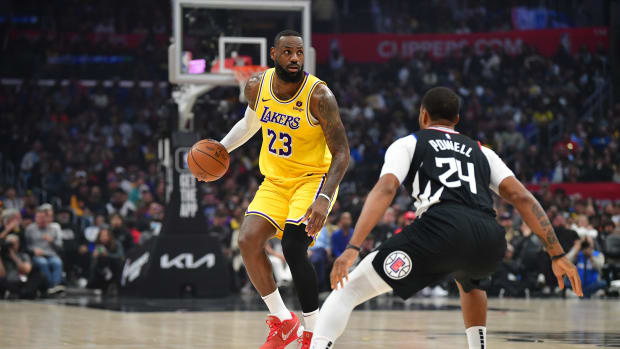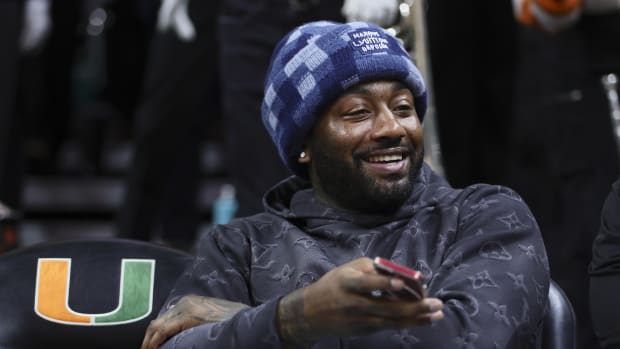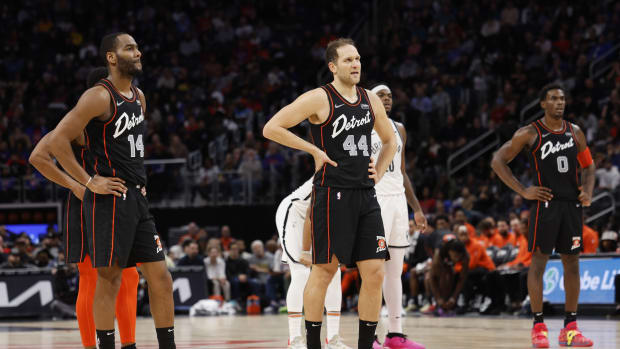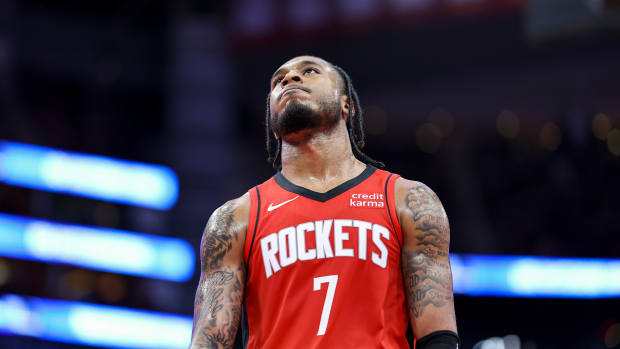Marouf Moumine Makes a Name for Himself at Jr. NBA Global Championships
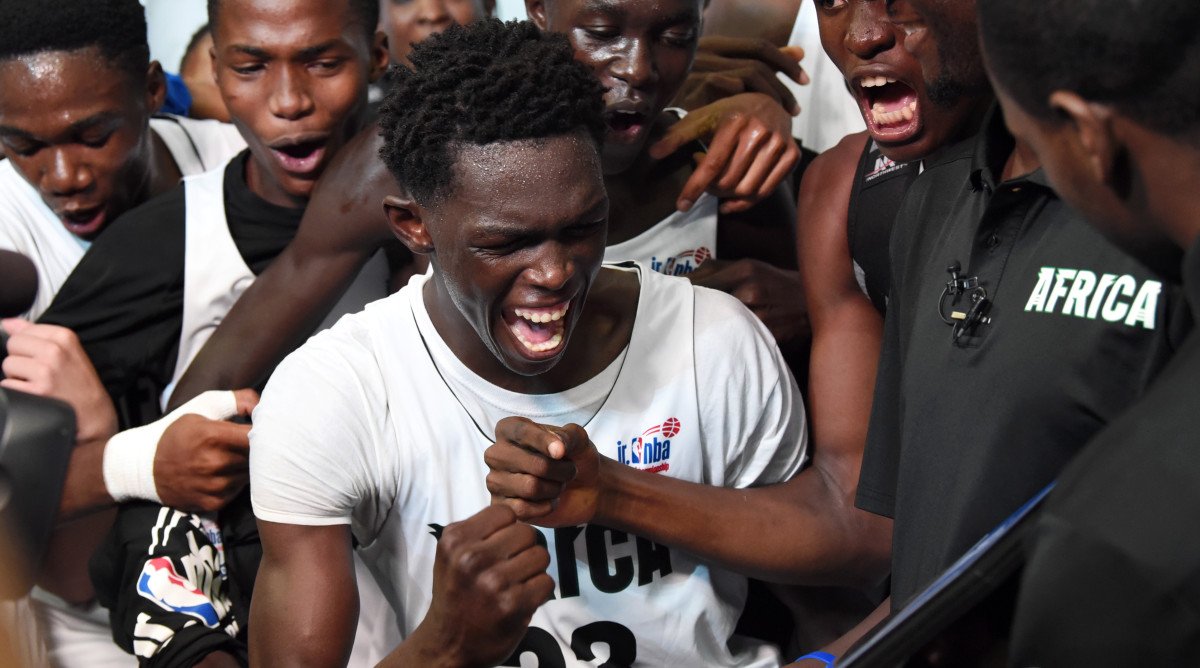
Fourteen-year-old Marouf Moumine said he sees himself as a player who likes to score and make the right passes.
Asked who he remind himself of, there’s a pause and then a knowing laugh between Moumine and his French translator, for the name that needs no translation.
"D-Wade."
Moumine, who is from Cameroon, was a standout in last year’s inaugural Jr. NBA Global Championship. He performed so well that recently retired Heat star Dwyane Wade asked to meet him following a 28-point, 21-rebound, 12-assist triple double in the semifinal.
"When you sit courtside and see a [then] 13-year-old record a triple double to help advance his team to the Global Championship, I needed to show him some appreciation," Wade said in a written response. "I wanted to make sure he knew that what he did was special."
The the now 6'5" Moumine returned with the Africa boys team to this year’s tournament as a name to watch, and he showed that last year’s performance was no fluke. He averaged 19.3 points, 9.3 rebounds and 5.5 assists heading into the final game and earned the tournament’s Determination Award for the second year in a row. While Moumine exited the championship game early with an injury Sunday, he still carried his team as the tournament’s leading scorer heading into that final contest and highlighted his skills with impressive dunks in the tournament. Between last year’s breakout and this year’s continuation, he’s become a fascinating case study in the NBA’s efforts to expand global youth development, and it is a major aim of the league to continue to grow events like the Jr. NBA Global Championship.
Back for its second year, the 2019 tournament finished Sunday after a week at the ESPN Wide World of Sports Complex at Walt Disney World near Orlando, Fla. Thirty-two teams (16 boys and 16 girl teams) with 375 players and coaches from 40 countries competed, with the winning boys and girls from each of the U.S. eight regional tournaments advancing. Similarly, the boys and girls teams representing the eight international regions advanced to last week’s competition, including Moumine’s Africa boys team. Following a tipoff ceremony and round robin games, the competition divided into U.S. and international brackets with the winners of the two brackets playing in the global championships Sunday, which Moumine and the Africa boys team lost 70-61 to the U.S. West team.
For David Krichavsky, the NBA’s senior vice president and head of youth development, the tournament was an opportunity to elevate the NBA’s focus on youth basketball, which the league re-doubled its efforts in 2015 to become more involved in the development of players at the grassroot and elite level. The 13 and 14 age category was meant to serve as a bridge between players at younger stages of development and those at the higher level. While the championships appear to serve that function, there is also programming catered to the Jr. NBA’s values of teamwork, respect, determination and community in the form of a community service project and more.
The global aspect of this championship was equally important, says Krichavsky, who sees the interactions in real time as different languages are spoken and kids make new friends: "You see our sport breaking down these barriers of nationality and language and culture, and that's something that's really unique to basketball. It's obviously happening at the NBA level, at the WNBA level, but there really hasn't been an opportunity like this before for kids from all around the globe."
After earning a Wade meeting last year, Moumine enrolled in the NBA Academy Africa in October 2018. The academy in Saly, Senegal, is one of seven across the globe for the top male and female prospects that uses a comprehensive approach to train kids both in basketball and life skills. There, the program’s technical director Roland Houston has worked with Moumine and has watched him develop into a more physical player.
"He plays with angles, he can get to the basket, he has a mid-range game, he's expanding his range, he's learning that he can actually be a really good defensive player because he's got great size and he's starting to buy into defense," Houston says. "I just think basketball wise, he has the package."
Houston doesn’t want to get ahead of himself when it comes to predicting Moumine’s future. He says he’ll be a college player for sure—more than 15 NBA Academy graduates have committed to NCAA D-I schools, including several from Africa—but it’s too early to predict if he’s, say, the next Joel Embiid or Pascal Siakam and will make the NBA. But Houston says there’s no limit to someone like Moumine who’s not afraid to put in the work. Come this time next year, Houston is expecting a major jump all-around between his performance on and off the court.
Before this year’s event started, Moumine traveled to the Academy games in Atlanta and got to go to New York last winter, where he reconnected with Wade at a Knicks-Heat game. Krichavsky says that interaction and excitement between NBA and WNBA players and kids is one of his favorite things to see: "For someone of Dwyane Wade’s caliber ... to seek out, to ask to meet Marouf [in 2018] and to have follow-up experiences like they did this winter, to me that shows that we're hitting our success metrics, that we're really getting all levels of basketball globally, domestically all excited about participating in this one event, we're achieving something."
Wade called it "rewarding" anytime he can help inspire a young player chasing a dream, so of course it was only fitting the youngster and superstar reconnected again once more this week, with a video showing Moumine teaching Wade his team’s dance going viral.
For Moumine, the first encounter with Wade made him feel like he could do it, and he’s used it as motivation to keep working hard.
"Every time I meet him it feels like a breath of fresh air," Moumine said.
































